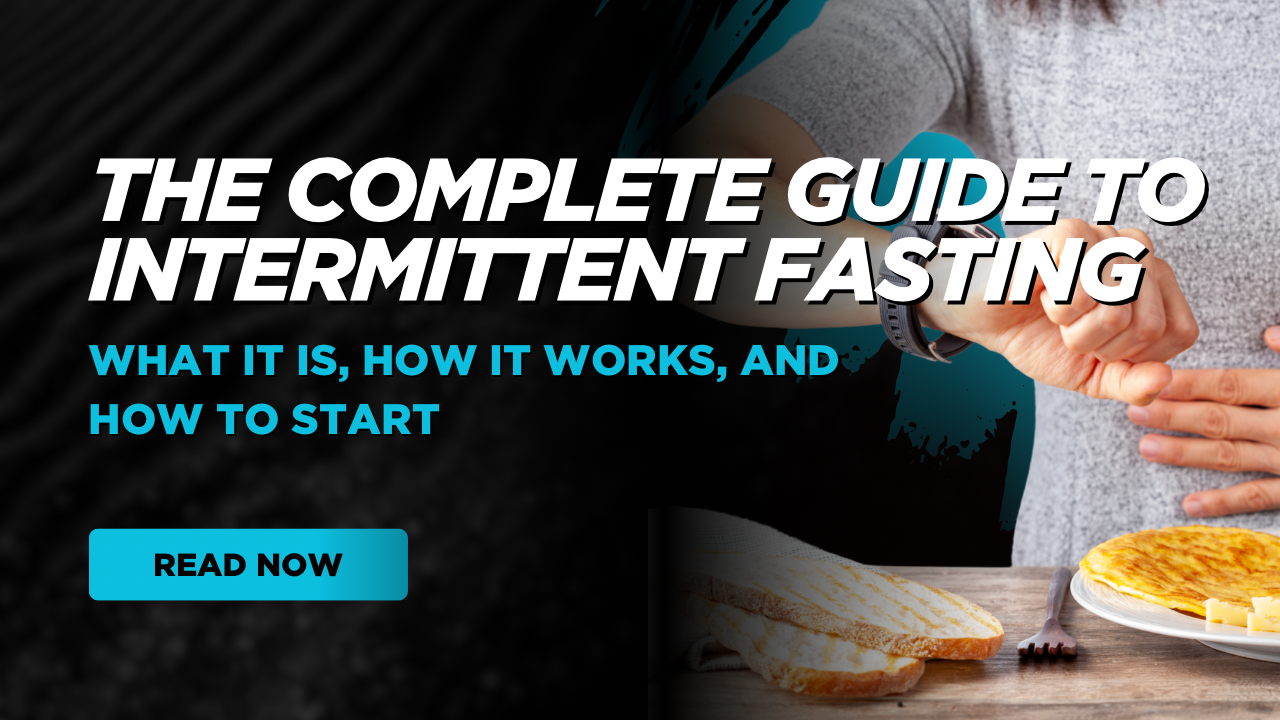The Complete Guide to Intermittent Fasting: What It Is, How It Works, and How to Start
Apr 14, 2025
Intermittent fasting (IF) has taken the health and wellness world by storm. But unlike most diet trends, it’s not about whatyou eat—it’s about when you eat.
Whether your goal is fat loss, better focus, or simplifying your eating habits, intermittent fasting could be worth exploring. In this guide, we’ll break down exactly what it is, the benefits, the potential downsides, how to do it properly, and how to stay safe if you're on medication.
What Is Intermittent Fasting?
At its core, intermittent fasting is an eating pattern that cycles between periods of eating and fasting. Instead of snacking or grazing throughout the day, you restrict eating to specific windows of time.
Popular styles of IF include:
-
16:8 – Fast for 16 hours, eat within an 8-hour window (e.g. 12pm–8pm)
-
14:10 – A gentler version with a 10-hour eating window
-
5:2 – Eat normally for 5 days a week and reduce calorie intake (500–600 calories) on 2 non-consecutive days
-
OMAD (One Meal a Day) – A more extreme version where all calories are consumed in a single 1-hour window
Potential Benefits of Intermittent Fasting
Many people turn to intermittent fasting for its wide-ranging health benefits:
🔥 1. Fat Loss & Improved Metabolism
Fasting periods increase insulin sensitivity and allow the body to access stored fat more efficiently.
🧠 2. Better Mental Clarity
With stabilized blood sugar and fewer energy crashes, many report improved focus and reduced brain fog.
💪 3. Simplified Eating
Fewer meals = less meal prep, fewer decisions, and often fewer calories without tracking.
❤️ 4. Reduced Inflammation
Studies suggest IF may help lower markers of inflammation, supporting overall health.
🧬 5. Cellular Repair & Longevity
Fasting activates a process called autophagy, where the body clears out damaged cells—a potential anti-aging mechanism.
Potential Drawbacks to Be Aware Of
Like any tool, intermittent fasting isn’t perfect for everyone. Common challenges include:
-
Hunger and irritability (especially in the beginning)
-
Low energy or dizziness, often due to low blood sugar or dehydration
-
Disordered eating risks, especially for those with a history of restrictive eating
-
Not ideal for certain populations, including:
-
Pregnant or breastfeeding women
-
Individuals with type 1 diabetes or adrenal issues
-
Anyone with a history of eating disorders
-
How to Start Intermittent Fasting (Step by Step)
Starting IF doesn’t have to be extreme. Here’s how to ease into it:
-
Choose your method – 14:10 or 16:8 are great starting points.
-
Ease into fasting – Delay your first meal by 30–60 minutes each day.
-
Prioritize hydration – Dehydration can mimic hunger and worsen fatigue.
-
Eat nutrient-dense meals – Include protein, fiber, healthy fats, and whole foods.
-
Stay flexible – It’s okay to adjust or skip fasting days if needed.
What Can You Drink While Fasting?
To stay in a fasted state, stick to drinks with zero or nearly zero calories:
✅ Water (still or sparkling)
✅ Black coffee (no milk or sugar)
✅ Herbal, green, or black tea
✅ Apple cider vinegar (a small splash in water)
✅ Electrolyte water (unsweetened and calorie-free)
🚫 Avoid:
-
Sweetened drinks, including diet sodas with artificial sweeteners
-
Coffee or tea with milk, cream, or sugar
What If You Feel Faint or Weak While Fasting?
Feeling lightheaded during a fast is common in the early stages. Here’s how to handle it:
-
Hydrate – Dehydration is a major cause of dizziness.
-
Add electrolytes – Low sodium, magnesium, or potassium can lead to fatigue.
-
Eat if you need to – It’s okay to break your fast. Listen to your body.
-
Review your meals – Make sure you're eating enough during your eating window.
Can You Do Intermittent Fasting If You Take Medications?
If you take medication, consult your doctor before starting IF. Some medications need to be taken with food, while others (like insulin or blood sugar-lowering drugs) may require dosage adjustments.
Your healthcare provider can help:
-
Time your meds around your fasting window
-
Prevent nausea or side effects
-
Ensure you're fasting safely without affecting your treatment plan
Final Thoughts: Is Intermittent Fasting Right for You?
Intermittent fasting is a flexible, effective tool—but it’s not for everyone. The key is to find a version that fits your lifestyle, energy levels, and health needs.
Start slow, listen to your body, and focus on long-term consistency over perfection.

